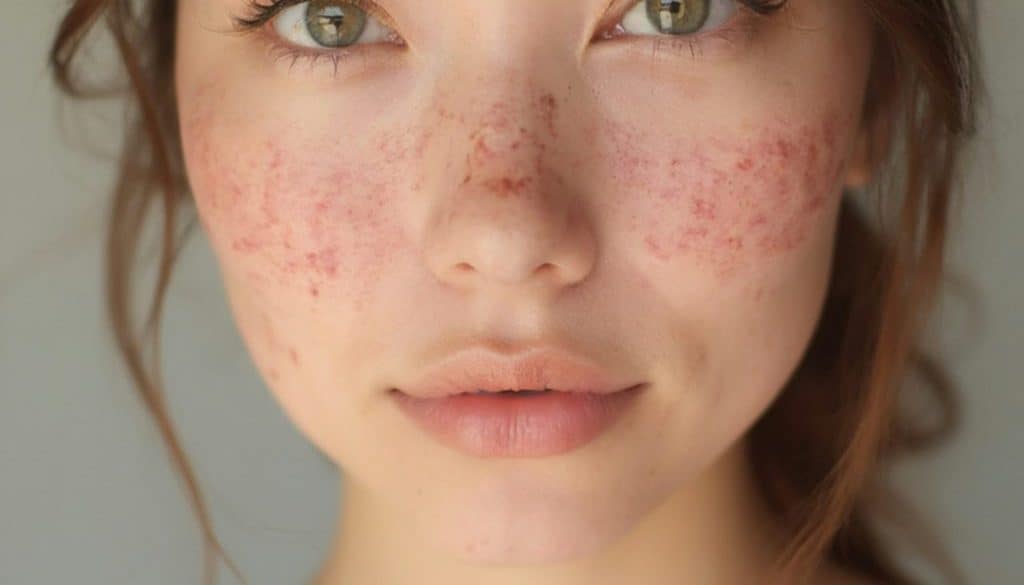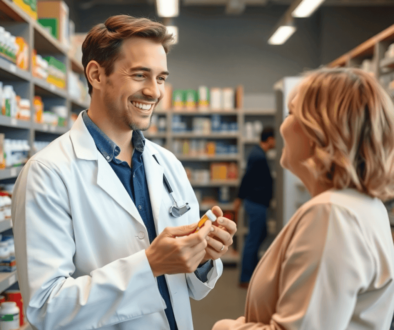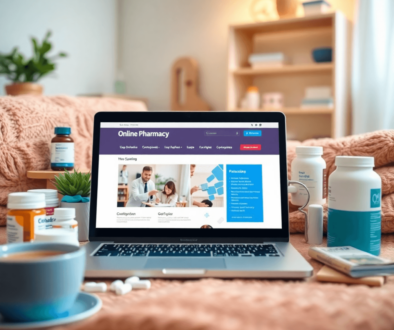Did Your Pharmacist Recommend These Acne Treatments?
Acne is a common skin condition that affects people of all ages. It can cause symptoms like:
- Spots and blemishes
- Oily skin
- Painful or inflamed areas
Acne can also have a significant emotional and psychological impact, often lowering self-esteem and confidence.
Pharmacists play an important role in managing minor ailments like acne. Their knowledge allows them to offer effective treatment options and personalized advice on suitable remedies. With the ability to recommend over-the-counter products, pharmacists assist individuals in finding the right skincare solutions while addressing any concerns about acne treatment. By using pharmacist services, people can take proactive steps towards achieving clearer skin with professional guidance and support and even access prescription acne treatments.
Understanding Acne
Acne is not just one condition; it includes different types, each showing up differently on the skin:
- Blackheads: Open comedones that appear as small black spots.
- Whiteheads: Closed comedones resembling small white bumps.
- Papules: Small, raised red bumps that can be tender to the touch.
- Pustules: Similar to papules but filled with pus, appearing as red spots with a white tip.
- Nodules: Larger, painful lumps beneath the skin’s surface.
- Cysts: Deep, painful, pus-filled lesions that can lead to scarring.
Understanding what causes acne is crucial for effective management. The main factors include:
- Hormonal Changes: Fluctuations during puberty, menstruation, or pregnancy can trigger acne.
- P. acnes Bacteria: This bacteria thrives in clogged pores and contributes to inflammation.
- Excessive Sebum Production: Overactive sebaceous glands produce too much oil, leading to clogged pores.
Acne can also have a significant impact on mental health and self-esteem. People may feel less confident and more anxious because of visible breakouts. It’s important to address these issues as part of acne management strategies.
The Role of Pharmacists in Acne Treatment
Pharmacists play a crucial role in the management of acne through their specialized training in handling minor ailments. Their expertise allows them to:
- Assess Skin Conditions: Pharmacists can evaluate the severity of acne and recommend appropriate treatment options tailored to individual needs.
- Offer Personalized Advice: Through consultations, they provide guidance on effective over-the-counter products and lifestyle modifications that may help improve skin health.
In many regions, including Nova Scotia, pharmacists have expanded their scope of practice with prescribing authority for certain medications. This includes the ability to prescribe:
- Topical Treatments: Such as benzoyl peroxide or salicylic acid-based products, which are effective for mild to moderate acne.
- Oral Medications: In some areas, pharmacists can also prescribe antibiotics or other treatments for more severe cases, streamlining access to necessary care.
These pharmacy services enhance patient access to effective acne management while reducing the need for multiple healthcare appointments. By leveraging their knowledge and skills, pharmacists contribute significantly to improved skin health outcomes for those affected by acne.
Over-the-Counter Acne Treatments Recommended by Pharmacists
Pharmacists commonly recommend starting with over-the-counter (OTC) treatments for individuals dealing with mild to moderate acne. These accessible options can be effective and are often the first line of defense before considering more potent prescription medications.
Common OTC Treatments Include:
- Benzoyl Peroxide:
- A popular choice known for its antibacterial properties. It helps reduce P. acnes bacteria on the skin and decreases inflammation.
- Available in various concentrations, starting from 2.5% to 10%. Caution is advised as higher concentrations may lead to skin irritation.
- Salicylic Acid:
- This beta hydroxy acid is effective in unclogging pores and removing dead skin cells, which can prevent new acne lesions from forming.
- Typically found in various formulations, including gels, washes, and spot treatments.
Effectiveness and Safety Profiles:
- Both benzoyl peroxide and salicylic acid have demonstrated effectiveness in treating acne, but individual results may vary.
- Key considerations from assessment questionnaires often highlight:
- The importance of patch testing to avoid adverse reactions.
- Recommendations for gradual introduction into skincare routines to minimize irritation.
These OTC options provide a solid foundation for managing acne effectively, allowing individuals to take proactive steps toward clearer skin before escalating treatment options.
When to Seek Prescription Medications for Severe Acne Cases
If over-the-counter (OTC) treatments aren’t working, it’s important to see a healthcare professional for prescription medications. Severe acne often appears as deeper, inflamed bumps that need more specific treatment.
Commonly prescribed oral antibiotics include:
- Tetracycline: This medication works by reducing inflammation and inhibiting the growth of P. acnes bacteria, which are often responsible for worsening acne.
- Other options may include doxycycline and minocycline, each with similar mechanisms in fighting severe acne.
In addition to oral antibiotics, topical treatments can also be effective:
- Tretinoin: A derivative of vitamin A, it helps unclog pores and promotes cell turnover, preventing new bumps from forming.
- Adapalene: Another retinoid option, it is particularly beneficial in treating inflammatory acne while being less irritating than tretinoin.
Severe acne may require a combination of both oral and topical treatments. By consulting a pharmacist or healthcare provider, you can create personalized treatment plans that are tailored to your specific skin needs and how your body responds.
Self-Care Strategies Recommended by Pharmacists for Acne Management at Home
Maintaining a gentle skincare routine is essential for individuals dealing with acne. This approach helps prevent irritation while supporting overall skin health. Here are some effective self-help techniques for acne management:
1. Cleansing
Use a mild, non-comedogenic cleanser twice a day to remove dirt and excess oil without stripping the skin of its natural moisture. Look for products labeled “oil-free” or “for sensitive skin.”
2. Moisturizing
Even oily skin requires hydration. Opt for lightweight, oil-free moisturizers that won’t clog pores. Ingredients like glycerin and hyaluronic acid can provide hydration without adding excess oil.
3. Avoid Oil-Based Products
Be cautious with makeup and skincare products that contain oils, as these can contribute to clogged pores. Always check labels for non-comedogenic options.
4. Hair Care
Hair products like gels or oils can inadvertently contribute to breakouts. Regularly wash hair and avoid letting it fall over the face. Keeping hair clean and away from the skin reduces irritation.
5. Hands Off
Avoid touching or picking at spots. This practice not only prevents scarring but also minimizes the risk of introducing bacteria to the skin.
Implementing these strategies can significantly improve acne management and enhance overall skin appearance.
Consulting MisterPharmacist™: A Valuable Step Towards Effective Acne Management
Seeking professional advice from your acne pharmacist can be a game changer in managing acne effectively. Here’s why:
- Personalized Treatment: Pharmacists can offer tailored recommendations based on individual skin types and concerns.
- Expert Assessments: Many pharmacies provide assessments to help identify the most suitable minor ailments treatments for acne.
- Prescription Options: Pharmacists are equipped to prescribe certain medications for acne, enhancing treatment accessibility.
- MisterPharmcaist™ can prescribe for these topicals products once only available under a canadian physician prescribing authority:
Adapalene
- Differin (adapalene 0.1% gel/cream)
- TactuPump (adapalene 0.1% + benzoyl peroxide 2.5% gel)
Azelaic Acid
- Finacea (azelaic acid 15% gel)
Benzoyl Peroxide
- Benzagel (benzoyl peroxide 5% gel)
- TactuPump (adapalene 0.1% + benzoyl peroxide 2.5% gel)
Clindamycin
- Clindoxyl (clindamycin 1% + benzoyl peroxide 5% gel)
- Dalacin T (clindamycin 1% solution/gel)
Dapsone
- Aczone (dapsone 5% gel)
Erythromycin
- Erysol (erythromycin 2% solution)
- Benzamycin (erythromycin 3% + benzoyl peroxide 5% gel)
Glycolic Acid
- Neostrata (various strengths of glycolic acid in creams/lotions)
Salicylic Acid
- Stievamycin (erythromycin 2% + tretinoin 0.025% + salicylic acid 5% gel)
Tazarotene
- Tazorac (tazarotene 0.05% or 0.1% cream/gel)
Tretinoin
- Retin-A (tretinoin 0.01%, 0.025%, 0.05%, or 0.1% cream/gel)
- Stieva-A (tretinoin 0.01%, 0.025%, 0.05%, or 0.1% cream/gel)
Trifarotene
- Aklief (trifarotene 0.005% cream)
Cabtreo®
clindamycin 1.2% adapalene 0.15% and benzoyl peroxyde 3.1%. An interesting triple combo with lower % of each individual ingredient, potentially reducing side effects while still providing effective treatment. The ingredients allow for more breath of action and less irritation from each individual ingredient at their more common individual strength.
Keep in mind that these Brand Name Drugs may need to be substituted to their Generic counterparts if your insurance imposes that option. Typically they would be substituted to a pharma company that produces many dermatological preparations like TARO.
Consulting your Misterpharmacist™ ensures you receive appropriate care and guidance, making it easier to address your unique skin challenges. Check if pharmacies near you offer assessments for minor ailments like acne for more targeted solutions.
Conclusion
Effective acne management strategies are essential for addressing minor ailments like acne. Pharmacists play a vital role by providing access to proper treatment options and tailored advice. To optimize skin health:
- Utilize pharmacy resources for over-the-counter treatments from trusted sources like MisterPharmacist™ Pharmacy, which offers a range of options including fast prescription delivery.
- Implement recommended self-care practices at home, such as maintaining a gentle skincare routine and avoiding pore-clogging products.
Taking proactive steps ensures that individuals can manage their skin effectively, leading to improved confidence and well-being. Your journey towards clearer skin starts with informed choices and professional guidance from your pharmacist.




